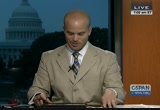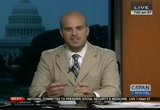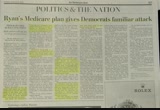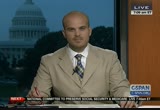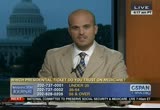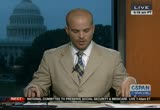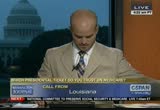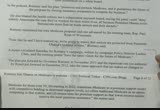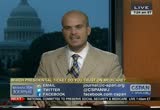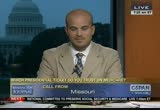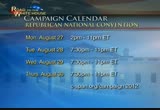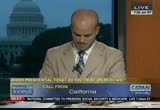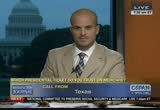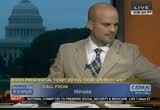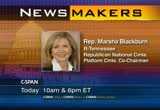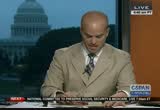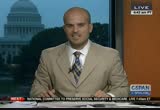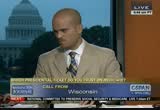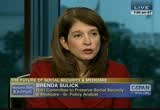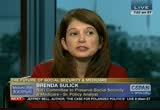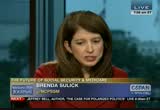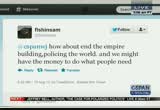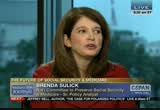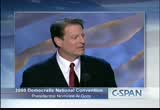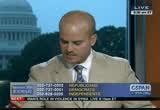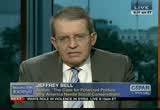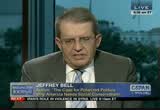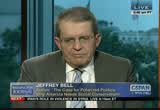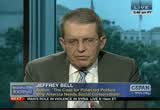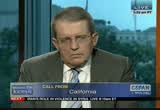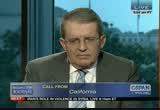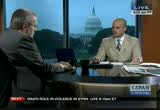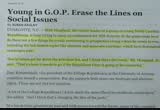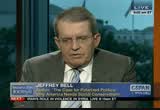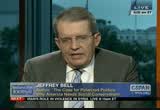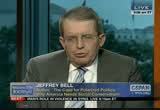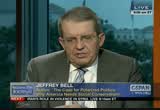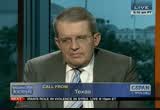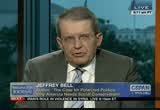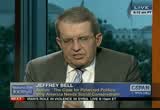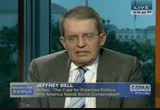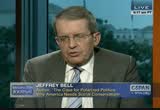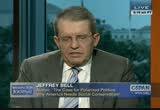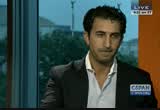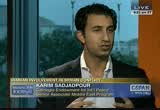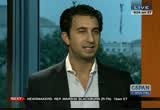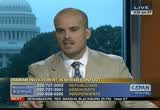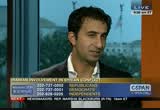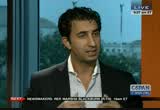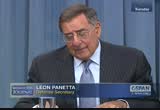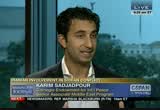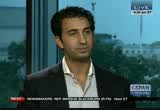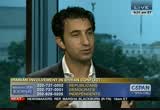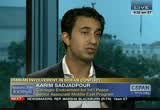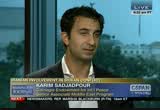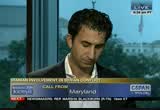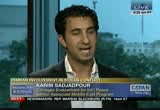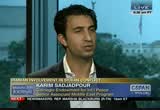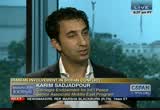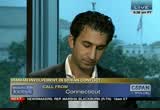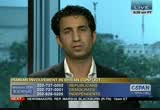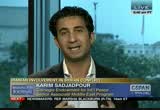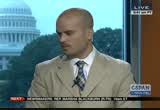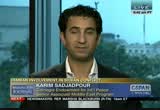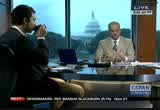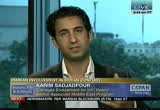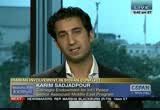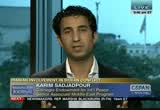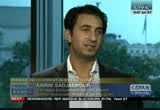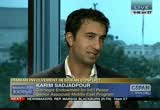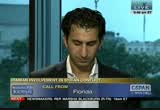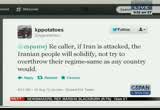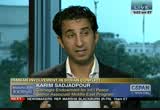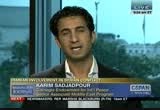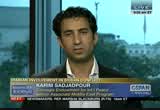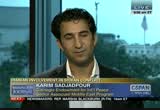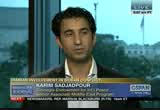tv Washington Journal CSPAN August 19, 2012 7:00am-10:00am EDT
7:00 am
♪ ♪ ♪ host: good morning, it is sunday, august 19, 2012. president obama and vice presidential candidate paul ryan both at the campaign trail to pilot medicare. it comes one week before the national party conventions are said to kickoff. our question for you this morning -- which party do you trust more on medicare and we want to know why? give us a call --
7:01 am
7:03 am
issue. we have a few comments already -- to talk more about this issue and the candidate appearances yesterday in florida and new hampshire, let me turn to stephen dennis of the "capitol hill newspaper." tickets through congressman paul ryan's campaign stop in florida. what was the campaign trying to
7:04 am
accomplish when he visited with his mom down there? guest: they are trying to help inoculate him against this medicare issue. by having him start off with his arm around his mom, betsy, what believe this 78. and is on medicare. he says to the audience of largely seniors, a senior retirement community, that he is there to protect her medicare and protect their medicare and to protect her grandkids. i think he did a pretty effective job. it was as good an event as they could have expected. they are going on offense against the obama campaign on medicare by pointing out the
7:05 am
$716 billion in medicare cuts that were used to help pay for the obama care -- the affordable care act. i think that will be an effective in attack that will help inoculate them against the concern that paul ryan's medicare plan will dramatically alter it and ultimately caused the republicans heartburn. >host: is this the debate the republicans 1 heading into their convention or is this something democrats will continue to push? guest: the republicans say they want the debate and paul ryan wants the debate. i have been covering congress and paul ryan for the past seven
7:06 am
years. there are many republicans in congress or behind the scenes who are very nervous. there would rather have a debate about the economy, about jobs, about the unemployment rate. this is a higher risk to debate for the republicans to be having because the democrats would rather be talking about medicare and fighting to save it. host: is this a short term debate or will this have top billing with employment? is it going to be medicare and the economy on the campaign trail? guest: i think it will and it will also be texas. the way the democrats are attacking the republicans, they
7:07 am
are joining in to obama's central campaign theme which is one of fairness. he is pointing to the tax breaks that george bush and republicans gave to the wealthy and repealing those and saying paul ryan's cuts to medicare will not pay for medicare, they will pay for more tax cuts for the wealthy. you'll see that in campaign ads and see democrats hammer on that point. it will be a theme in charlotte for the democratic national convention and it will be something democrats will keep hammering for the next couple of months. host: tickets for the president's appearance yesterday in new hampshire. -- take us through the president's appearance yesterday
7:08 am
in new hampshire. guest: he picked up on reports that we and other publications have reported that under paul ryan's plan which he published in 2010, mitt romney would not have paid much taxes at all. the effective tax rate would of been about 10 -- about 10%. the original paul ryan proposal eliminates all taxes on capital gains and dividends. even though mitt romney made over $20 million last year, his total tax bill would have been a couple of hundred thousand dollars. the president basically pointed to that and said paul ryan put out a proposal where mitt romney would pay about 1% taxes and he wants to cut your medicare. that is something where you see
7:09 am
his super pak start running some ads on that theme. i think it is something that they want to keep hammering away at -- this idea that the republicans are out there for the wealthy, not out there for you. and that the medicare changes are big and scary. there is some irony to this because theryan-romney medicare which affects people under 55 primarily and says we will have a system where you can get private insurance and they will compete and you have the option of traditional medicare -- that is very similar to the health insurance plan for non-seniors that mitt romney put in place in massachusetts and barack obama put in place for the affordable care act.
7:10 am
7:11 am
we want to compare that to the obama medical care plan. we want to take you now to paul bryant talking about is medicare proposal and florida yesterday. [video clip] >> here's what the president will tell you about his medicare plan, obama care. the president raised $716 billion from the medicare program to pay for the obama care program. [boos] what's more, in addition to that, he put the board of 15 unelected democrats in charge of
7:12 am
medicare who are required to cut medicare in ways that would lead to denied care for us -- for seniors. [boos] from medicare a set brigit officials themselves -- one out of six of our hospitals and our nursing homes will go out of business as a result of this. 4 million seniors are projected to lose their medicare advantage plans they enjoy and shows under this obama care plan. [boos] the president's campaign calls this an achievement. do you think raiding medicare to pay for obama care is an achievement? do you think comparing a board of bureaucrats to cut medicare and achievement? either to buy. do i .
7:13 am
medicare should not be used as a piggy bank for obama care. host: that was congressman paul ryan going after president obama's medicare proposal down in florida yesterday. let's bring in some callers and we will start in boston, mass., on our 35-54 line. who do you trust more on medicare? caller: i don't trust either party. neither one of them are telling the truth. from what i have read, the president has not stolen the money. he has redirected into the medicare program. they will be targeting the $6,400 or more so both sides do not tell the truth.
7:14 am
host: thanks so much. let's take you to president obama in new hampshire going after paul ryan and mitt romney for their medicare proposals. [video clip] >> you would think they would avoid talking about medicare given the fact that both of them have proposed to voucherize the medicare system. i guess they figure the best defense is a good offense. new hampshire, this is what you need to know -- since i have been in office, i have strengthen the medicare. [applause] i have made reforms that have extended the life of the program and have saved millions of seniors with medicare, hundreds of dollars on their prescription drugs, [applause] the only changes to your benefits that i have met on medicare is that medicare now
7:15 am
covers new preventive services like cancer screening and wellness visits for free. host: a few comments already coming in on twitter this morning -- we will continue this conversation with an over 55 from buffalo of this morning. caller: good morning, i trust the obama administration. you had a guy from cnbc on last week, larry cudloe. he made no bones about being a
7:16 am
republican but he said this orion plan is not what it seems and the need to watch it. when they privatize it, especially the younger ones, who was going to make sure they pay into their private deal? i'm going to vote against vicky hartzler here in missouri. i don't think the senior citizens -- that think they will be all right. i have watched paul ryan and i cannot buy what he is dishing out. host: do you think that medicare now becomes the issue of the
7:17 am
presidential campaign or is this something we're talking about now because paul ryan has put out this proposal in the past? he has been spouting this stuff in congress for quite a while. there is a lot of republicans in congress that don't agree with him. i have a lot of republican friends around this area, i and 30 miles north of springfield, missouri, and we have a show on the radio every sunday morning and there is a lot of concern about it. i believe they have a chance to make is bad for the country.
7:18 am
as far as that $700 billion he was talking about, that is waste, fraud, and abuse. if you've got an ingrown toenail, you can get an electric wheelchair. medicare has to pick up that cost. i think the good part of that waste is pretty heavy in this area. host: thanks for calling in this morning. here are a few more weeks -- tweets -
7:19 am
7:20 am
i want to go to joel on our over 55 line from charlotte, north carolina where the democratic convention will be in about two weeks. caller: thanks for taking my call. i am in senior citizen, i am in my mid it-70's. this game they are playing is a bad deal for the seniors. i am 74 years old and the republican party has never done anything to help the middle class or the working poor. they have always made change for the wealthy and taken from the
7:21 am
poor kids in school. the breakup -- the republicans didn't -- never did anything to help this country with that problem. all of a sudden, they will help medicaid? it does not sound right. even the decent people and the republican party know the republicans have always given everything to the wealthy and big business. host: thanks for calling in. this is more from paul ryan yesterday in florida. [video clip] >> we think the best way to save medicare is to empower 50 million seniors, not 15 bureaucrats to make their decisions and how they get their health care. [applause]
7:22 am
mitt romney and i will protect and strengthen medicare which are promises that we made that people organize their retirements around, like my mom. host: paul ryan was talking about his mother in florida at that speech he made at the villages retirement community in florida. this is paul ryan on the front page of " the new york times." we will take a call from duane on our 35-54 line from louisiana. caller: good morning. that would be 35-40. roosevelt started the program.
7:23 am
they want medicare and medicaid to keep going. with the republicans, they say they want to privatize it. they want to make a business of it. the thing is, with older people, my grandmother, my mother, they cannot afford medicaid. i like the democrats. host: i want to take you to a report from cnn.com to clarify the position of paul ryan and mitt romney on the paul ryan plan.
7:24 am
7:25 am
we go to cheyenne, in st. louis, millet -- missouri, on an hour under 35 line. caller: i am not sure who i am leaning toward on this subject. a little bit more toward obama -- when you think about a president, you have to take into consideration the things that they set forward. may not be accomplished in their term alone. that is why we have to vote for them again or take another president that has the same values. host: you are under 35, how much to you and the people in your age brass -- bracket discuss this issue since paul ryan was put on the ticket? >> i am fairly new to the whole voting thing. i am just 19.
7:26 am
so irying to be informed can help. you never know, it could be your vote that helps america. host: do you think medicare will be around but the time you turn 65? caller: that is the big fear. i have talked about with my parents and grandparents. my grandpa used to say that he did not think it would be around for a few years after my mom's generation. host: thanks for calling in. we'll go now to the over 55 live from minneapolis, minnesota. thank you for calling in. which party do you trust and the medicare issue? caller: good morning. i am old enough to remember that
7:27 am
we were going to wither on the vine and that's what it looks like. they're just taking money out of regular medicare. they took the seventh -- the same $700 billion that obama talks. they will continue with medicare but will not have any money left. with obama care, it will take money and put it back into the social security system. if you want to continue medicare -- another thing is, a lot of the nursing homes are charging 70-$100,000 per year. people cannot afford it. what will happen to our senior citizens that will not be able to go to nursing homes? thanks so much for discussing this subject. host: thanks for calling in.
7:28 am
7:29 am
wednesday and thursday, we will bring you live floor coverage from 7:00 p.m.-. 11:00 p.m. eastern- we want to send you back to new hampshire for a little bit more on president obama disgusting the differences -- discussing the differences in medicare. [video clip] >> they want seniors to get a voucher to buy their own insurance which could force seniors to pay an extra $6,400 per year for their health care. this is not my estimate. remember those guys who analyze those things for a living? that is their assessment. that does not strengthen medicare. that fund does the very guarantee of medicare. that is the core of the plan written by congressman ryan and endorsed by governor romney. host: we are hearing from you
7:30 am
this morning on "washington journal" about who you trust more on the medicare issue. this is from our under 35 line from california. caller: good morning. caller: good morning. i want to say that i aside more with the democrats and obama. i believe they put ryan on the ticket before they were -- when he came up with his plan before, they were trying to privatize medicare and now that he is on the ticket, there is some much fear going on, he is operating around with his mother saying they want to keep everything the same. i do not really trust the republicans right now on the ticket as far as what they are saying. host: is the under 35 voter, how important is this medicare debate to you? caller: i know you asked the
7:31 am
previous caller and i do not know how much they're trying to scare the public. i kind of figure it will not be there by the time i get to that age. i kind of fear for my parents because they are 56. we are not well off. this is something my parents will really need. they will need the money to be there by the time they get a little bit older. host: gloria from california. thank you for getting up early and calling in. i want to take it in another comment from facebook --
7:32 am
host: we will get into those issues in our next segment, continuing the discussion on medicare debate and what is going on on the campaign trail when we are joined with brenda sulick of the national committee to preserve social security and medicare in about 10 to 15 minutes. right now, we go to rick from virginia on our 35 to 54 line. caller: good morning. i am 45. i am on disability now. the insurance doctor said my injury was healed but it is old age. i do believe that the democrats will do the most for medicare. if you look at what the republican party's actions have been, the house has done nothing for any of the people not in the top 2%, such as jobs bill.
7:33 am
second, look at what the republican party wants to do with the clean water act. 79 of our rivers were on fire. the republican party is the only one that has lied to the people for the top 2%. i want to know how much is enough. my personal feeling is that if anybody votes for republicans, they are in the top 2% or ignorant. i just want to ask the opinion. host: was rick from virginia. we want to take you to a couple of other headlines out there. this is from "the new york times."
7:35 am
host: we will get more into that subject in our third segment today. we will be talking about iran and its role in the syrian conflict starting around 9:15 a.m. we will continue this medicare debate and who you trust more. let us go to bill on or over 55 line from texas. good morning. caller: good morning, sir. >> your thoughts on who you -- host: thoughts on who you trust more with medicare. and why. caller: republicans preach individual responsibility. i have been to countries that do not have social programs and i see how it works. and i want you to realize the republicans look for ways to
7:36 am
save money. the voucher program just means that if you do not have enough money to use it with more, you do not get it. think about it. i get a sunday paper every day for every weekend. better not mean i can use of coupons in it -- that does not mean i can use all of the coupons in it. if health insurance does not go down, think about this -- we never get our cost of living raise. they're always behind. what happens on insurance when you have a voucher? host: bill from corpus christi. thank you for calling. we will try rockford, illinois with peter. good morning. caller: hello. how're you doing? the lady that called in earlier pretty much stole my thunder. i was going to remind people about newt gingrich and how he wanted that program to whether
7:37 am
on the vine and rick perry said social security was a ponzi scheme. ron paul said he wanted to faded out. all the republicans disputed it. that is basically all i have to save for it now. host: thank you for calling. this week on c-span's " newsmakers" -- our guest is marsha blackburn, co-tier of the republican national committee's platform committee. she is from tennessee. that committee's hearing starts on monday. the congresswoman spoke with reporters about the platform and the convention. here is a listen. [video clip] >> i think there is agreement and unity that what we need to make certain we do is continue medicare and as it is. for those that are 55 and above.
7:38 am
and allow those seniors to have that certainty. i have to tell you when i'm talking to my constituents, some might seniors are saying we want more choice and more options. they would like to see some more choice and options available to them. what we want to make certain we do is to provide stability and certainty in the medicare process. you know, we have to realize the medicare trustees have told us that we are spending more money than we are taking in and we have to be mindful of putting this on a stable platform and returning that medicare program to fiscal health. it means we do need to go through some reforms that will provide some certainty, stability, and take a long-term view the of that program. host: if you want to hear more
7:39 am
from marsha blackburn, co-share of the platform committee for the republican national committee, watcher today at 10:00 a.m. and 6:00 p.m. on c- span. host: a couple more calls on this subject of medicare and to you think is better suited in this election cycle that fits your needs on medicare. we will go to sam from albany, new york. thank you for calling in. caller: hello. i think it is not fair really for people to have worked their whole lives and now these politicians are taking away everything. it is not fair to people number one. number two, the politicians will do what ever helps them. we should be boycotting them and not work for them and they should be out. that is the best way to deal
7:40 am
7:41 am
7:42 am
column on "the new york times." we will go to dan from plano, texas this morning to get his thoughts on this medicare debate. thank you for turning us. caller: yes. good morning, everyone. i believe all this debate regarding medicare is little more than a distraction. if you look at the numbers, the real problem is medicaid. we have tens of millions of anchor babies in their parents writing on medicaid. that is costing us a fortune. that is not to mention all the millions that we spend on other babies. that issue has to be dealt wh in if it is -- host: what you think about congressman ryan's plan? caller: it is probably the only
7:43 am
solution. if we leave it in the hands of the fed's kamahl they will do is continue to pander to the hispanic and the others whose votes they count on to repaid -- regain power. from we can give you more the wall street journal -- "the wall street journal" article on the issue of medicaid. at the romney plan would turn metal -- medicaid into a block grant program, giving control to states. brian's plan has noted that savings are about $770 billion over 10 years. that is compared to the white house plan on the issue of medicaid. expanding medicaid, reworking a formula on how much federal government gives states in the program and $70 billion combined with a couple of other changes. that is from "the wall street
7:44 am
journal." we are going to get a couple more calls. joe is on the under 35 line from wisconsin. thank you for calling. caller: hello. i wanted to say that people need to be a lot more informed about who they vote for. i was able to read some parts of the bills that were proposed during obama's first campaign and i was able to read hundreds of pages of nonsense. if it is possible, get as informed as you can. on medicaid, you know, i just turned 29. if i make it to retirement, they say it is supposed to be going up again. it was 65 a couple of years ago and they say by the time i
7:45 am
retire, it will be in the 70's. i am concerned whether it will be around when i get that age. host: joe from wisconsin. thank you for calling. a couple more tweets -- host: in our next segment, we will talk about social security and medicare with brenda sulick. later, we are joined by jeffery bell to discuss his new book which claims social security is a driving force.
7:46 am
first, an update on the sunday shows from c-span radio. >> the focus continues to be campaign 2012. here the replays of the program starting at noon on c-span radio. first up will be "meet the press." the host will welcome bob mcdonnell who chairs the republican governors association. maryland governor, martin o'malley, and chairs the democratic governors association. also, ted crews. -- cruz. at 1:00 p.m., on "this week" with george stephanopoulos, the guest is with the obama campaign and another with the romney campaign. a debate about whether the u.s. is headed towards bankruptcy. the panelists for that includes chris van hollen and grover norquist.
7:47 am
at 2:00 p.m., "fox news sunday." they will talk with the romney campaign and the obama campaign. at 3:00 p.m., "state of the union" includes the romney campaign and the obama campaign and rick santorum. at 4:00 p.m., "face the nation" will talk with dick durbin and former new york city mayor rudy guiliani. the sending network talk shows rearing on c-span radio are brought to you as a public service. listen to them all starting at noon eastern on c-span radio. 90.1 fm in the washington area. nationwide on xm satellite radio channel 119. listen on your but. android, or iphone or go online to c-span.org.
7:48 am
>> tonight, on the "q&a," walter pincus talks about his various jobs on the journalist, his views on u.s. spending overseas, and his criticisms of the defense department's budget priorities. >> they built a $4 million facility. 40 people. it has -- if you spend $4 million on an elementary school, somebody would raise questions. >> more with walter pincus tonight at 8:00 p.m. on c-span's "q&a." >> "washington journal" continues. host: with the medicare debate front and center, we will continue this discussion this morning with brenda sulick of the national committee to preserve social security and medicare. first off, do you think what we are seeing now is a debate we will see through november or is
7:49 am
this attention just a short-term reaction to paul ryan joining the ticket? guest: good morning. i think we will see this throughout the election. the polls are showing that unemployment and jobs are still on top issues for folks. people are really concerned about medicare. this is a great opportunity for people to learn about the system and also what is ahead for them and what these plans that are being proposed really mean. >> tell us about your organization. the national community -- committee to preserve social security and medicare. caller: we were started by fdr's son. our whole mission is to protect benefits for our members, seniors, and everything we do is focused on protecting benefits. and strengthening the system. we have over 3.5 million
7:50 am
members int -- and supporters from all over the country. we are a non-partisan organization. we have about -- have for democrats. 25% are independents and 25% are republicans. our hope is to educate and we have a great website that breaks down the information for folks to understand. these are complex programs. www.ncpssm.org. www.ncpssm.org. host: talk about the health care -- medicare proposals we are hearing so much about and what your groups insist the right way to preserve medicare. guest: first, i want to talk about the proposal that is being put out there by the romney-ryan campaign. this is a very -- this is not a
7:51 am
modest change. it is a radical departure from what we have in medicare right now. there is a lot of rhetoric going around. we want people to be educated and understand the issues. first of all, this plan would and traditional medicare, privatize the system, and it turned seniors over to deal with insurance companies. we hear a lot about choice, but it would hurt choice in that it would make it harder for seniors to choose their own doctors. also, it rolls back important benefits that are already in the law, such as it would increase cost sharing, preventive benefits, and raise prescription drug costs. we do not think it is a good idea. host: what you think a president obama's plan that he has talked about? guest: he seems to be very
7:52 am
interested in protecting these programs. seniors rely on them. they are lifelines. i think something that a lot of people do not realize is that most seniors are not wealthy. they rely on medicare and social security -- to live. we want to make sure they are strong for all generations. host: respond to the criticisms about president obama's plan for medicare. in this week's "weekly standard" they lay out the same standards ryan was putting forward. he says obamacare will be a fiscal nightmare and a disaster for public --
7:53 am
guest: there have been a lot of advertisements about that. it is semantics. some people say that there are cuts. some say there are savings. the president has not cut benefits through the affordable care act. in my opinion, the thing we did we are seeing a lot of talk about that from conservatives because we know that people like the traditional medicare system. polls show that republicans, democrats, and independence watch the programs -- want the programs to stay as they are. what happens when you start learning about the details of what though ryan-romney plan is -- people do not like it. there is a lot of rhetoric. all i would say to folks out there is you do not have to believe me, but look at the organizations who have been working to protect these benefits for many years.
7:54 am
do not listen to the politicians. organizations like the national committee, the center for medicare advocacy, the center for medicare rights, go on their website in learned the issues and make your decision. host: if you want to join in on the conversation with brenda sulick of the national committee to preserve social security, give us a call on the republican line at 202-737-0002. democrats' line, 202-737-0001. independents line, 202-628-0205. we will talk about romney and ryan releasing their own advertisements about cuts that they say the president's plan makes medicare -- i want to play you an ad going after romney and ryan on medicare. [video clip] >> i am barack obama and i approve this message. >> mitt romney is attacking
7:55 am
obama on medicare. aarp says it strengthens benefits. the ryan plan would undermine these and could lead to higher costs for seniors. experts say ryan's voucher plan could raise future retirees cost more than $6,000. get the facts. host: i want to read some more from that "weekly standard" article. his host: talk a little bit about
7:56 am
this. >> the comments you just read -- guest: the comment you just read do not sound true to me. this independent payment advisory board is a group of people that would be appointed to help provide ideas for a lowering medicare spending. what happens is it is not a done deal. after they submit recommendations, congress has the opportunity to look at them, change them, make other options. if they do not, the decision goes into place from the ipac. there is a lot of misinformation out there. this group cannot ration benefits, increased premiums for seniors -- there is a lot of information out there. this is a board that is like a
7:57 am
backstop to help keep medicare costs within reason. host: ari getting comments on this topic today on twitter -- guest: good morning. first, i would say that is a false claim. if you look at the law, it did not take -- affordable care i did not take 1 cent out of a guaranteed medicare benefits. what it did is it put into place some different ways to strengthen the program. we have seen it has strengthened the program by about 8 years by doing some things that are smarter in terms of making health care more efficient such as coordinating care. especially seniors may have several doctors. they are taking a lot of
7:58 am
medication. having somebody to coordinate that so we do not duplicate efforts into things that may hurt the person and cost more money. host: let us get some calls. eugene is waiting on the republican line from jackson, michigan this morning. thank you for calling. caller: yes, sir. michigan. thank you for taking my call. just a couple of comments about social security and medicare and in 2010 and 2011, there was no cost of living. that money has taken away $6 billion per year from social security forever. they say there are 10,000 people joining social security from the baby boomers. by 2025, that will cease. the baby boomers will be -- after that, they will be going
7:59 am
away. there will be 10,000 less per day on social security. by 2030, there will be 15,000 less on social security. if it is privatized, where is the money coming from to pay the people that run privatization? leave it like it is. it is good. if they did not steal from social security, there would be no problem with it. by 2030, there will be no problem with it. thank you very much. guest: thank you. i appreciate your comment because i think the caller is exactly right. the baby boomers will not be here forever. the way the system works is the trust funds for social security are being spent down in a way -- we knew they were coming. changes were made in the 1980's to accommodate for this. the system is doing what it had planned to do. if the system is privatized, it
8:00 am
could be very scary for seniors. you could run out of money. social security provides a guaranteed benefit that you cannot tell live. we agree. we think the programs should stay as they are. they might need modest changes, but we do not need to destroy them. host: i want to mention this headline from "the associated press." host: talk of little bit about this social security deal and whether this is a fact of life for people that the deal is not as good as it once was. guest: i think social security
8:01 am
is a good deal for current generations and future generations. it is social insurance. some people will need the benefits. some people will not. what a lot of people forgetting is that social security is really a family-based program. it is not just retirement benefits. it has a benefit for survivors. it has benefits if you are on disability. i have several friends whose parents have died when they were young and if it was not for the benefits helping them, i do not know how they would have gone along. we have to think about all of the pieces of the program. host: we will go to beverly on the independent line from north carolina. thank you for calling. caller: hello. i agree with the young lady who is sitting there. the republicans -- all they have to do is look at all of this money that is coming in to their
8:02 am
program. billionaires' do not help little people. obama is trying to get the fraud out of medicare. that is where it this 700 something billion dollars is coming from. if you are going to a hospital and you see the lights that are often for no reason, people using telephones for no reason -- we are paying for that. that is fraud. as far as romney and his running mate are concerned, they ran on one promise in now that they see that things are not working right, they are dumping -- jumping the gun. they are totally dishonest. i would never vote for them. thank you. guest: thank you for your comment. i want to add that you are right. one of the areas when they talk about these cuts to obamacare,
8:03 am
this comes from savings. it is a greater focus on waste fraud and abuse since the law has been in place -- i have seen estimates between five and $10 billion that have been recovered to the system for medicare. overpayments to insurance companies is another area that bilal looks at. i agree. thank you for your comment. host: we are talking about paul ryan's visit in florida yesterday at a retirement community. i want to play more from that and then get your reaction. [video clip] >> our plan does not affect the benefits for people who are in or near retirement. [applause] it is a promise that was made and it must be kept. in order to make sure we can guarantee that promised for my mother's generation and the baby boomers who are retiring, we
8:04 am
must reform it for my generation. save it for this generation, reformate for my generation so it does not go bankrupt when we want to retire. [applause] the good news is, there are bipartisan solutions to do this. the plan we support originated in the clinton commission's plan to save medicare in the 1990's. it is a bipartisan plan in congress today. it is a plan that says do not changed benefits for people 55 and above and for those of us who are younger, when we become eligible for medicare, we get a choice of guaranteed coverage of chintz. guaranteed affordability, including traditional medicare. we get to pick the plan for us. when we retire. that means all those providers -- we do not have to beg for the
8:05 am
mercy of 15 bureaucrats to get health care. host: i want to get your thoughts on that. guest: i have many comments. there were in number of claims made. first, we keep hearing that the ryan budget will not affect people 55 and older. it is for people younger than that. first of all, that is false. look at what the plan would do -- it would roll back changes that are in the law right now for people who are getting preventive benefits, they do not have to be the co-pays and are getting free well as visits and it lowers prescription drug costs. also, when we keep about the idea of choice, it is really benefits the insurance companies. there may be more insurance companies, but seniors will have less choice with their doctors. i want to say one more thing about bipartisan claims. there was one democrat, senator widened -- wyden who worked
8:06 am
with ryan on his first plan. i do not know of any other democrats that have signed onto the plan and now in the next version of the ryan plan, even senator wyden says that is too many cuts. i keep hearing that but i think when you think about 435 people in congress and one who looked at an older plan -- that does not sound that bipartisan. host: what about his claims that it stemmed from the clinton era? guest: there has been talk about premium support for 15 years. again, the bottom line is it has not gone through or gotten very far because what it does is it spends traditional medicare, privatizes the system, and leads people to deal with insurers. people do not want that. host: a comment on twitter --
8:07 am
host: michael is waiting on the democratic line from pennsylvania. good morning, michael. caller: good morning. thank you for taking my call. instead of changing medicare as we know it and as we like it, why don't we raise the cap on social security and then use a percentage of that to shore up medicare? thank you for taking my call. guest: thank you for calling. that is a proposal our organization look set as a positive. we look at that in terms of helping make social security solvent for a longer time. with medicare, there are other things that we can do to strengthen the program and improved benefits for the beneficiaries without destroying the program and turning it
8:08 am
around. there is a number of things. we have already seen that by providing health care delivery and smarter ways, that helps. we could allow the government to negotiate for part b prices for medicare. the bottom line with all of this and we talk about the ryan plan is that it does not get to the real core problem of what the rising cost are. there are more seniors coming into the system. it does not address that the real problem is rising health- care costs. in dealing with insurers. ryan's plan does not do anything to address that. it just cuts benefits. host: we want to talk about this as a campaign issue and look at some information put out by a pfizer family foundation. 73% describe medicare as very
8:09 am
important or extremely important to their vote. future retirees with fixed payments for purchasing private coverage -- ryan's proposals turned the program -- is providing retirees fixed payments or traditional medicare arguing that having seniors manage their own health care will help bring down costs. republicans accused the obama administration of cutting $716 billion to pay for obamacare. talk about this on the campaign trail and what you have seen. guest: what i have seen from the polls is that when it comes to medicare and social security, the american public does not want these benefits changed. that is why i think when you are talking to your elected officials or researching information, look at what the different options really say. the ryan plan privatizes medicare.
8:10 am
i think people do not want that. we have a population where we need to keep our middle class. we want people to get to the middle class and stay there. medicare and social security were put into place because the private insurance market did not work. they did not want folks with a lot of chronic conditions and before the programs were put in place, we had 35% of older adults in poverty and 50% did not have health insurance. we do not want to go back to that. guest: paul ryan -- host: paul ryan is -- was in florida yesterday. thank you for calling in, john. caller: hello. i wanted to mention when social security first began, it was originally intended for poor and elderly, not as a retirement system. at the time, there was 16 workers for every one person collectively.
8:11 am
as we all know, it will go down in a couple of years. i guess it is 3 to 1 right now. it is not sustainable. it is the same thing for medicare. when they sold it, they said it would cost a certain amount of dollars. we know that it costs -- that costs have increased over the years. it is not sustainable. the liberal you have up there -- god, bless you, but the bottom line is we have to do something about this. if we do not face it now, it will collapse. thank you. guest: thank you very much. thank you for the complement. god bless you. i would have to disagree with you. we do want to make sure these programs are solvent for the future for all generations. look at social security. it is not in crisis. it is not going bankrupt like he
8:12 am
might read about. when you look at the trustees' report, nothing -- if nothing is done, after 2033, it can pay 75% of benefits. we do not want cuts but with modest adjustment, we could easily resolve the issue. it is a matter of priorities in our country. host: do you think social security should be a top issue this year or you are saying it is not part of the fiscal crisis we are approaching? guest: i do not think social security or medicare should be part of the deficit reduction debate. these are important programs. we need time to look at the issues and get real solutions that do not heard people and not do something that is rash that will possibly put some people in poverty. host: let us go to wisconsin. democratic line. thank you for calling. caller: hello.
8:13 am
good morning. i am on your side. people do not understand i worked in health care. when i call older people and get them registered for appointments, they are concerned about insurance. they're concerned about medicare. me being a cancer survivor, i thank god for the obama plan. i would not be today and i want people to realize when you have older people that want to cancel theirbecause they are not they are covered or do not have some things to find ways -- medicare needs to stay right now. for future generations -- whatever weeks we need to make, we can make them. we can do everything. thank you. guest: i agree with your comment. seniors are worried. that is why our organization really is trying to educate people.
8:14 am
people can make up their own decisions, go to our website and other organizations. this is what we have been doing for many years. not just in an election year. look at the data and make your decision from there. i do not like when i hear that there is information that is scaring seniors unnecessarily. host: you talk about educating yourself on this issue. president obama trying to educate folks on his medicare plan. here is more from that. [video clip] >> my plan cracks down on fraud and waste and insurance companies subsidies. [applause] their plan make seniors pay more so they can get another tax cut for millionaires and billionaires. my plan is our extended the life of medicare by nearly a decade. [applause] their plan would put medicare on
8:15 am
track to be ended as we know it. it would be an entirely different plant. a plan in which you could not count on health care because it would have to be coming out of your pockets. that is the real difference between our plans on medicare. host: again, we are with brenda sulick of the national committee to preserve social security and medicare. on twitter -- guest: i have heard that before. people do talk about that. i look at a lot of the research and right now, we do not see that happening. there are a lot of people and medicare as a big market. most doctors seem to be taking medicare clients. host: we will go to the independent line from tallahassee, florida. thank you for calling. caller: good morning.
8:16 am
if you look at the past performance of both parties, i think you can kind of see the liberal policies have not worked. it seems to me that it is time to change. you cannot spend more money than you make. we have been giving money away. the other thing is, i thought medicare was a trust fund. i do not know how they can take money out of a cut -- trust fund without the american people agreeing to do that. they seem to just take money whenever they choose and that does not seem right to me. the other thing is, your guest seems to be a little bit biased for these liberals. i do not know why, but i think
8:17 am
that we need to look at the facts. we need to choose the person that will do the best job for us. host: you said your group is not as partisan. do you want to address his concerns? guest: we are nonpartisan. we hear from members and supporters from all different parties. the one thing we all agree on is that we want to keep these programs from for future generations. i think i have to disagree with you in terms of the fact that these programs are not working. social security and medicare are the most successful programs we have in our country. they have been responsible for getting a lot of people out of poverty. people that insurance companies did not want to serve in the past. seniors tend to have multiple chronic illnesses and they cost the system a lot of money. with medicare, you have a guaranteed benefit. you do not have to worry about that.
8:18 am
with private insurance, that is a different mandate. they are a business. they need to make sure that they are making a profit. that could mean that they will want to have healthier people go in their system and that will help the -- will not help the people who really need help. host: we have questions about funding. take us through that and how it gets taken away from medicare. >> -- guest: there are two trust funds. the health insurance, and that is forepart day and then there is another trust fund which is the supplemental medical insurance fund. that covers part the end d -- part b and d. folks get a small percentage taken out of their check to pay for future benefits.
8:19 am
we have a board of trustees who make projections and recommendations about where the system is going in and people just do not take money out willy-nilly. it is looked at by the trustees and recommendations are made. i want to mention that there needs to be strengthening in medicare, but the system has been extended 8 years and that the system can pay a poll benefits -- full benefits and after that, it can pay hospitals and other providers 87%. we do not want any cuts. these programs are not in bad shape that you hear about. we do not need to destroy it. host: since you talk about funding for medicare and you are
8:20 am
the national committee to preserve social security and medicare, can you talk about social security? guest: social security is a trust fund and it can pay paul benefits and a -- full benefits until 2033. then after that, if we do nothing, it still pays 75% of all benefits. we are not talking about a system that is bankrupt. it is not in crisis. we do have an area that we need to fill overtime to make this program 100% for everybody. nobody wants benefit cuts. there are many ways that can be done. one person mentioned possibly raising the cap. after that $110,000, you get taxed on your social security. we could raise that and that
8:21 am
would help resolve a big part of the problem. host: what did you do before your current job guest: i would have worked in the 18 field for 20 years. i worked for the alzheimer's association, the aarp, i did research at the institute on aging at portland state university. this is an area that i have spent my career in and i believe the national committee is really looking out for faults and that is one of the reasons i went there. host: we will go to james from new york. thank you for calling. caller: hello. good morning. i have a question about social security and medicare. right now, i am receiving social security and medicar a, b, and d. i have epilepsy, which affects
8:22 am
27 million americans presently. i am on vimthe, which is accepted by medicare. they will not pay for most medication because it is prescription. out of my social security, i am on tier one. i pay $208 a month for my medication. after i fall into a doughnut hole with the insurance company, i have to pay $600.99 for a month's supply. that seems to be too much for an individual like myself to control my seizures. i do not know what to do. i have tried the insurance companies do you have -- do you have any recommendations? guest: a lot of people are in
8:23 am
similar situations. they have high drug costs. luckily, through the affordable care act, the doughnut hole will be closed by 2020. in your case, i would need more information and specifics, but what i suggest is that you can go on to our website. we have a wonderful resource called asked mary jane. she is a person who works for social security. you can write in to our website and we can research for you. our aim is to help educate people and help them when we can. give us a try. www.ncpssm.org. host: the website is on the screen. we will go to the republican line from new castle pennsylvania. thank you for calling this morning. caller: good morning. thank you for taking my call.
8:24 am
i am listening to you and i am very upset. you are telling me and the rest of the country that we will have the choice of doctors with obamacare. i go to doctors in pittsburgh. my daughter had a stroke. we have doctors here in newcastle. 82%, and do not tell me this is a fact because i know, 82% of the doctors are giving up their practice because they do not want to deal with obamacare. host: where you getting that number? caller: we will have our choice, all right. my daughter had to wait for five months to get an appointment in pittsburgh. five months. what if you were going to die within five months? that is what will happen with obamacare. host: let us give brenda sulick a chance to answer. guest: i am sorry i upset you
8:25 am
with my comments but i am not familiar with your statistics. that is really frustrating under any health plan. sometimes, it takes longer for a doctors appointment. i would say that under obamacare, one of the things it does for people that really are sick is it prevents insurance companies not taking -- not turning away for pre-existing conditions. before that, you would be lucky to get an insurance plan or you would pay a high premium. i am sorry my answers are frustrating, but i cannot agree with you. host: let us go to new jersey. independent line. go ahead. caller: good morning. the senator from vermont is the only politician i have ever heard come out and specifically say that if the cap was raised from $110,000, $250,000 per
8:26 am
year, it would solve the problem. are there any other politicians that you could tell us who are also in agreement with senator sanders? guest: good morning. none are coming to mind, but i am sure there are. senator sanders has been an advocate for this issue. he is also one who has tried to get members of congress to not include social security, medicare, and medicaid in the deficit debate. again, raising the cap is one way that can help the solvency of the system. i do not have any specific answers, but i hope more people think about that. host: on twitter -- guest: exactly.
8:27 am
we do have that. we have a mixed system right now. we have traditional medicare, 75% of older adults that are on medicare are on traditional medicare. 25% of seniors have chosen medicare advantage plans. these are plants that are run by insurance companies. folks do have choices in that area if that is what they would like. host: we have a couple of minutes left with brenda sulick. we will go to phil on the independent line from somerville, south carolina. caller: good morning. how are you? you are not going to like listening to me. guest: that is ok. caller: it seems like the one thing you are leaving out is the part about romney and ryan eating children.
8:28 am
your non-partisan perspective is really something to behold. your connections with the non- partisan aarp -- we are spending ourselves into oblivion in this country. for years and years, we have been borrowing more money than we are taking in. it has got to stop. if you had been on the line with me a couple of minutes ago, you would have heard my grandchild. we are putting that child into deeper and deeper debt all the time. people like yourself, all you care about is continuing the status quo as it is now and you do not have any regard for what will happen 20, 30, 40 years down the road. host: we will give brenda sulick a chance to respond. guest: i am sorry you feel that way. i am very concerned about these
8:29 am
issues. i have spent my career working on them. i think there are ways to fix these issues and resolve them. nobody is saying status quo, but we are saying let us not destroy these programs and use radical solutions that could hurt people. i think americans would like to see fairness. we would like to see everybody pay their fair share in taxes. i think it is a country where if you have done well, that means paying your fair share of taxes. we all need to take individual responsibility, but these programs are safety net programs. sometimes things happen, even when you do the best you can, and they need to be there for folks when they are in trouble. host: we will fit in dave on the democratic line.
8:30 am
caller: i am on the national committee to save social security and medicare. they should stop the trust funds. that would help the system to launder. they tax social security benefits after you retire. they have a limit where it starts kicking in and affecting low income people. i would like to see if they can get a law passed to raise the bar so low income people would not have to be taxed. host: your final thoughts? guest: those questions will take longer to answer. contact our office. we are there to help our members as a resource. right in to ask mary jane. we would also like to hear suggestions from folks. we're always open to that. please contact us. we will keep your issues and considerations in mind. thank you very much.
8:31 am
host: brenda sulick from social security, thank you for joining us. next, former policy adviser to ronald reagan jeffrey bell will join us to discuss his new book that claims social conservative a driving force in american politics. later, we discuss iran's role in the violence in syria. [captions copyright national cable satellite corp. 2012] [captioning performed by national captioning institute] >> together, let's make sure our prosperity in riches of working families. let's invest in health care, education, a secure retirement, and middle-class tax cuts. i am happy the stock market has boomed and so many businesses
8:32 am
have done well. this country is richer and stronger. my focus is on working families, people trying to make house payments and car payments, working overtime to save for college and do right by their kids. >> the last time taxes were this high as a percentage of our economy, there was a good reason. we were fighting in world war ii. today, our high taxes fund a surplus. some say the growing federal surplus means of washington has more money to spend, but they have got it backwards. the surplus is not the government's money. the surplus is the people's money. >> suspend has aired every minute of every major party conventions since 1984. we're now in the countdown to this year's conventions. you can watch our live coverage of the national conventions live on c-span, c-span radio, and
8:33 am
online at c-span.org. >> tonight, walter pincus talks about his stories jobs as a journalist, his views on extravagant spending overseas, and his criticism of the defense department priorities. >> it has a band. it have rooms -- it has rooms for every person. >> that is tonight. >> "washington journal" continues. host: some political strategists have argued mitt romney's best path to victory allies in focusing on the economy and jobs. jeffrey bell joins us to lay out
8:34 am
his belief for why america needs social conservatism to play a role in the debates. lay out for us what you call the case for polarized politics. guest: polarization is almost always depicted as a complete-. when you think about it, it does a service to voters by letting them have a clear estimation of the choices involved in an election. in times of polarization, and voters are well aware of what the stakes in the election are and are better able to make an informed decision. host: help people to understand this particular passage from the end of your book. use a social conservatism and economic conservative is a -- economic conservatism must end
8:35 am
the idea that they are fundamentally unrelated rome. guest: we have seen countries where the social revolution had a complete victory in western europe and japan. those countries seem to be going out of existence. the fertility rate for women is as low as 1.0. that means people born in those countries are not replicating themselves, so the countries as we know them will not exist in a while. that aspect of social issues is an existential issue for society in the short run or medium term, having a low birthrate means the work force is aging, if you get less growth, it also means we have
8:36 am
fewer workers supporting people who are on entitlements. >> you say the basic difference between social conservatism social liberalism lies in their reading of the first few sentences of the declaration of independence. guest: if you believe literally the declaration says all men are created equal and that gives them the right to life, liberty, and the pursuit of happiness, if you believe those rights come from god and cannot be taken away by government, odds are you are a social conservative. even if you like those words and see the mainly as a metaphor that does not really exist, that you cannot have human equality in the present but have to work toward it as a goal, you are less likely to be a social conservative. host: if social conservatism is
8:37 am
as important as you say it is, why is that the conventional wisdom that mitt romney needs to focus on the economy in this election? guest: i had an interview five or six months ago with "the wall street journal. " he was interviewing me because rick santorum was doing well in the primaries. the wide assumption was social issues can be very important in republican primaries. when you get into the general election they do not matter. but i predicted that despite all the preoccupation with the economy, this is a year when social issues are going to come re in the general election. i made the point that when that happens, the republican party tends to benefit. in 1988 and 2004, social issues
8:38 am
came to the fore. this also happened to be the only two elections where the republicans won the popular majority. i do not think that is unrelated. the fact that issues seem to be unrelated such as things as the mandate on contraception and the referendum type issue of gay marriage or the democratic platform will be for it and the republican platform will be opposed to same-sex marriage, those to the issues making it inevitable that social issues will be in the news regardless of what the strategists think. host: when do you think these come into play? guest: i think you will hear
8:39 am
about them in the presidential and vice-presidential debate. they will be in advertising. many people thought governor romney would not do advertising related to a social issue, but he has done one. that concerns the hhs mandate the requires catholic organizations and individuals to subsidize practices a thing. morally wrong. he has done an ad on that. -- to subsidize practices they think are morally wrong. he has done and at on that. people went to check filet -- chick-fil-a. that surge indicates the same- sex marriage has a lot of juice behind it. the parties are already polarized on that issue. host: what happened to rick santorum in the primary?
8:40 am
why did the republican party not pick him? guest: governor romney covered his face on that. he gave a debate in september. he gave one of the best explanations i have heard about why the same-sex marriage issue will not wind up as a state-by- state issue and why you have to have a national outcome one way or the other. .e has run as a pro-lifer rick santorum benefited from his social conservatism, a romney covered his tracks and came about just as socially conservative as rick santorum. host: if you want to talk to mr. bell about this issue and his book, give us a call.
8:41 am
i have a twitter question for you from the urban politico. can social conservatives market themselves successfully? guest: i think so if they keep it on the basics of the issue. republicans do not want to have an argument over whether the contraceptive built should be legal. but it is an invasion of religious rights, what the hhs is telling the catholic church and others who disagree with contraception. furthermore, they include early term abortion and sterilization as items that have to be paid for by catholic organizations. if it is on those issues, i do not think it will be a close call, particularly on how catholic voters will react. host: bob, you are on with
8:42 am
jeffrey bell. caller: thank you for taking my call. i think the best is right. -- i think the guest is right. so often, -- i am sorry. i needed to turn my tv off. we have the issues. when they are clear, everyone gets to make the choice they want, whether you are a conservative or liberal, republican or democrat. when the issues are clear, we get to choose the one we want. i think that is better for democracy, not worse. what bothers me is when one side or the other muddies the waters and says we are close. we are not. we have real decisions to make. we have real questions on
8:43 am
whether morality is still important in america. i think it is. others do not. these are things we have to work out as americans in the next 20 years. i am concerned. host: jeffrey bell, you say the social conservative movement is uniquely american. you write it is less than 50 years old. trace the roots of the movement. guest: it goes back to the reaction people had to the 1960's, the tremendous upheavals that took place in the 1960's and culminated in 1968. a big moment came during the democratic national convention 44 years ago, 1968 in chicago, when the television networks cut away from proceedings in the convention hall and went out to the streets where there were riots taking place involving young people, mainly college
8:44 am
students, and the police and national guard putting them down. the three networks assumed televising these things would benefit the demonstrators, that people would overwhelmingly sympathize with the demonstrators. in fact, the reaction of the vast majority of people was in favor of the police, i think because they sensed the kind of principle of order in our society was under grave threat. they were right about that. but it was a complete shock to the networks and elite opinion in general that people have such a different reaction from what they expected. that was the beginning of polarization and the social conservative movement.
8:45 am
in europe, the same things were happening. there was tremendous and rest. at one point, 12 million people were on strike in france. -- there was tremendous and rest. there was not a social reaction hat.he rea i think the reason we have in it is not so much because we are more religious, but because of our founding, the fact that we say that all men are created equal, that we have these god- given rights. we believe there is something in this country that is self- evident truth. it was harder, even though the new left in the 1960's was very powerful, they found it much harder to displace those convictions among the people in the united states.
8:46 am
host: you say in your book social conservatism is now in a three-way competition as a movement to lead the world in the future. explain the. guest: two views came out of the enlightenment. one was the left enlightenment as we know it today. the second is the conservative enlightenment which had great influence in britain and america and europe. that is the one i just described, which is the basis of our declaration that we believe our rights come from god and not government. the third, i include islam because it is a religion but it is a completely politicized religion. the koran recognizes no distinction between religion and the state. it is taken for granted in
8:47 am
fundamental is long -- islam the politics is the facilitator of religion. it universal vision. it is religion-based. it also is a politics first operation. it is a universal political vision in the sense to deism and christianity are not because they see some separation between the state and religion as being important. those are the three universal political visions. there are others that are not universal. there are other universal visions that are not political. those of the three political things in contention for the future. host: john is on the democratic line from tucson, ariz. caller: how is everybody? host: do you have a question?
8:48 am
caller: i do not understand this stuff. this is really deep. host: mr. bell, talk about your past work. you worked for reagan, nixon, and ran for congress. guest: i ran for the senate in the state of the jersey. i ran on the tax cut before it had become the reagan tax cut in 1978. i should not admit how long ago that was. iran in the primaries on the same day proposition 13 was passing in california. when i defeated an incumbent senator, i got my 50 minutes of fame. unfortunately, my opponent was bill bradley. i lost the general election. but i was very involved in the reagan campaign in 1976 and 1980. i think what i did have some
8:49 am
impact on the way he ran on the tax cut. my day job now is pushing for enactment of a gold-backed dollar at the american principles project. i am the director of policy. my specialty is working on the gold standard. some people have commented it is ironic i did a book on social issues when forequarter decades of my life and work heavily on economic issues. the supply-side movement in the 1970's and 80's and now the effort to get back to gold as money. as i went on in my career as a candidate and helping presidential candidates, it struck me that social issues were constantly being underrated. they had more obituaries written about them than mass murder. yet social issues never go away. they keep coming back to have a
8:50 am
big impact. i think one reason they are predicted to die out is to have died out in western europe. part of what they do in the book is try to figure out why that was true. host: it is republicans that predict this as well, that social issues have died out. guest: it is a universal view among journalistic and political elites with a few exceptions. that is one reason why wrote the book. it seemed to be something everyone knows but never comes true. host: a question from max. polarization takes advantage of ignorant voters, just ask karl rove. your response? guest: i do not agree. it is true social liberalism sometimes corresponds to getting a doctorate, but i think social conservatives have a full vision of what should happen.
8:51 am
the increase in fleet. today increasingly have a view of economic policy and social issues. i think those views are based on reality. there also based on 200 years of american history. social conservatism has taken a big banner that was dropped. yet it still has tremendous resonance among the people because a lot of people believe in the principles of the founding. host: we will go to keep on the independent line from nashville, tenn. you are on with jeffrey bell. caller: your guest is making an excellent case for polarization. his demonstrating why people should vote for president obama -- he is demonstrating why
8:52 am
people should vote for president obama. the first thing he tries to do is scare people by telling them the sexual revolution will lead to the demise of the country. the country will disappear. perhaps he wants us to be like the countries in africa where everyone is over-populating and starving and dying of diseases. perhaps this is the vision he has for america. host: your thoughts on what you are saying clinton democrats' hands? guest: on over-population, i think that is a myth. the big problem today is under- population, declining female fertility in the developed world. it is also happening in the islamic world and in east asia. the one-child policy in china is from the left. it is indisputable the aging of
8:53 am
the workforce and a decline in female fertility correspond with the entitlement crises and slower economic growth. just ask western europe. in terms of polarization, i agree with the caller. we need to have a clear choice for those who think we're on the right course in western europe has done a great job with their economy and cultural issues. they need to vote for president obama because he is taking us down that path. the voters of western europe did not benefit much from polarization. they drifted into bureaucratic rule from brussels and the european union without fully understanding that was the choice they were getting. host: let's go to bring on the republican line -- let's go to brenda on the republican line.
8:54 am
caller: when i was in college, i was taught to be a republican because of fiscal responsibility. during the eight years of bush who came in with a surplus and decided to take it because it was the people's money, polarizing america and deciding the republicans not to help get ourselves out of the state we put ourselves into, because of that point, deficits did not matter. when we talk about the moral majority and doing -- during that time, i watched my party compete in so much corruption. we had ted haggard, the head of the republic party, become a
8:55 am
drug addict and homosexual. we're polarizing america. all we do is talk about sex and getting up into a woman's vagina. guest: i would like to ask the caller the last republican president you voted for. host: i think we lost her. guest: it did not selling somebody who voted for ronald reagan. -- it did not sound like somebody who voted for ronald reagan. it was a series of talking points. out by the obama campaign. i cannot think of anything to say. host: this politico story talks about a poll from earlier this summer and that americans trust obama over mitt romney on social issues. 52% to 36%, according to an ap
8:56 am
poll from june. what makes you think republicans want to have the social argument? guest: a more specific question came up from the gallup organization about a month ago right after people were digesting the fact obama had endorsed same-sex marriage. they asked voters if his support of same-sex marriage makes you more or less likely to vote for mr. obama. although it was divided 50/50 as to whether people supported same-sex marriage or not, twice as many voters said it made it less likely. that is the bread and butter of elections, what really moves the vote. in north carolina, they had a referendum during the primaries.
8:57 am
same-sex marriage and civil unions were rejected 61% to 39% in a state obama carried in 2008 and where they have decided to hold their convention because they were hoping to carry it again. after that junction of the events, north carolina swung over to the other side. the same thing happened over the same-sex marriage issue in missouri when they had a referendum during their primary in 2004. kerry was ahead in polls prior to that. after that, he never led the democrats. this is what really matters, what drives voters from one camp to the other. host: you bring at north carolina. here is a story from earlier this month. it says in charlotte, the county leaders of the group of north carolina republican's is busy trying to ramp up incurred --
8:58 am
support for mitt romney. he says social issues are far down the priorities list, and i think that is the trend. that is where it needs to go if the republican party is going to be successful. guest: it is ahistorical to say that. it has not happened that way. when they have come to the fore, and the balkans have one two of the last six victories that way. the reagan realignment between 1976 and 1984, social issues were very prominent in those elections. it is ahistorical to say
8:59 am
republicans are help wind moral issues fade from the scene. host: who is a young republican in the media? guest: i have not had a problem making my point because the facts are on my side. the young people do not want to hear about it. they are not interested. for them, is a matter of wishful thinking. they do not want to engage in what it is not true. host: steve on the democratic line from texas, you are on with jeffrey bell. caller: i did not vote for reagan. i am 51. i have been voting since 1979. i would like to say one thing about social issues.
9:00 am
i follow politics -- i have followed politics my entire life. the republicans have tried to cut medicare, the social programs that matter to people or help people. they have been against us from the beginning. it is a red herring for mitt romney to say something -- they will fix something they will cut. if you look at social issues with respect to religion, how can you say you are religious? if you look it jesus christ's teachings, he is a liberal. i love my lord and savior. host: i will give you a chance to respond. guest: in 1944 and 48, thomas dooley was the republican nominee for president. in those elections, the more
9:01 am
affluent you were, the more wealth you had, the more likely you were to vote for him. he carried the northeast, the most affluent part of the country in. everything was kind of turning on economic issues. in economic status. george w. bush was the nominee in two different elections nearly 60 years later. there, the key thing was whether you were a religious. if you went to church on sunday, most weeks, that was the greatest predictive factor in whether you were a bush voter. that is a tremendous change. does it mean that every voter is in the republican party? no, but there are more religious voters in the democratic party. that is why social issues, even
9:02 am
today when they are so well defined, there are votes to be gotten from the democratic and independent ranks by social issues on the republican side. host: scott on twitter -- host: your thoughts on the issue of polarization and whether congress can get anything done? guest: that is true in a sense. i have had certain experiences working with congress -- i worked on the tax reform act of 1986. the final vote to bring the top rate from 15 to 27% in the senate was 97 to 3. i was working with bill bradley, the man who defeated me in the general election when i ran for the senate, as well as with jack kent.
9:03 am
there was little polarization because one side had prevailed on the desirability of lower tax rates for the broader base to make it revenue neutral. that can happen again. it can happen in the 2012 election and at some point, certain political elites will go over and say yes, i guess this issue has been decided. whatever romney wants to have been is the first thing he wins in 2013 -- something that has a good chance of happening. i think polarization defines the choices, but once they are made, you can make surprisingly quick progress. host: you make of paul ryan? guest: he is a conservative movement person. he has helped to unite and energize the republican party and it is also a decision by governor romney to have a
9:04 am
referendum on the deficit and entitlement reform, as well as the state of the economy. i am in the minority in thinking that the state of the economy is not a complete republican lay up because if you take a poll today, you have voters blaming president bush for the financial crisis that we are still kind of trying to get out of. they do remember that it happened under bush and not obama. it is a delicate problem on the economic issue on how romney says obama has failed, but i am not going back. i think he can win on that, particularly with a 4-looking program. it is not a simple matter of just saying if we helped -- tell people the economy is not good, the republicans win. host: let us go to james from michigan. you are on with mr. bell. caller: good morning. i was just calling to wonder why
9:05 am
the republican primary, when the first date that they voted on, as soon as it was over, they said mitt romney had one and then two weeks later, they said rick santorum won. three months down the road, they never even mentioned that ron paul actually won. ron paul has carried delegates in five states. why is it the republican party did everything they could to keep him down and put in mitt romney? i am a former republican. >> host: your thoughts? guest: that was one of the worst breaks and pellet dental -- presidential caucuses that there was no benefit from the wind. romney one in the initial count and the republican party seem to
9:06 am
like it that way and even when the votes came in and santorum had one, the party in charge of the vote counting did not acknowledge that. that was a tremendously bad deal for the santorum campaign. ron paul finished third dead date -- that day. later, he did better in getting delegates in some states than he did in the election vote. i would also say that ron paul has a tremendous impact on our race, particularly his support for radical economics. part of what romney is doing by picking paul ryan is enabling him to unite the party and bring in those people who feel we need major steps of the economy. host: let us go to miami, florida with dennis. good morning. caller: good morning. thank you for being here.
9:07 am
this is a very interesting show. i have a couple of comments that i would like you to give your comments on. number one, it seems to me that many people in the republican party are making the defense that they claim to be fiscally conservative and that is all they are focused on so they say they are also socially liberal. to me, i do not understand how you can hold that the vision because it causes all kinds of economic problems in society. the breakup of the family. the demographics do not work. we're not reproducing ourselves. the use of drugs which are illegal will cause all kinds of fiscal problems. that is number one. i just find it humorous when the democrats are always accusing the republicans of being
9:08 am
obsessed with the social values issues when they are the ones who are simply trying to maintain the status quo and the democrats are really the ones that are upset with the social values issues, trying to change everything. guest: i would agree, particularly with that second point. the hhs mandate did not have to become an issue unless the obama administration wanted it to. i think they were very aware of the fact that it was not going to be welcomed and the catholic church in amongst other religious people when they said it yourself ensure, you have to pay for not just contraception, but sterilization and early term abortion. they believe in it. they actually believe in it and that is why this will be a very clear choice. they did it regardless of what effect it might have. now they will make the best they
9:09 am
can of it. as far as social, liberal, and conservatives, i believe that there are inconsistencies with that. life is it logical and so is politics. there are voters who see themselves as economically conservative and socially liberal. they are swing voters in places like the northeast and northwest. states like washington and oregon as well as new england and new york. in the midwest, the swing voters are more socially conservative than economically conservative. the heartland, the midwest, countries that do not have an ocean coastline, r d -- are the states that decide this national election. their social issues will benefit romney more than they will in the northeast or part of the far west. they also have a chance of benefiting him more than economic issues will because
9:10 am
some of those states in the heartland have made decent economic recoveries in are not as focused on the recession has states that have not made a recovery. host: we are talking with jeffrey bell, an author. his second book published in 1992. he got his b.a. from columbia university. he is a veteran of u.s. army in vietnam. we will go now to jan from dallas, texas on the democratic line. good morning. caller: good morning. i do not know what thomas dooley has to do with jesus, but by your logic, the republican party is made up of people who handle snakes hunt. you are equivalent to everything that is wrong with the
9:11 am
republican party right now. i do not think romney will be able to play -- 2 do you think social issues will come into play in november? caller: i do not think god will come into play. host: you think it will stick to the economy and jobs? caller: >> he will not be able to play god because of his mormon is some. what we're seeing here is the same thing we had with the crazy old lady that john mccain had. he is putting things were any question he gives comes down to democrats are bad. guest: i might be a little larize. i am guilty on that. i think romney is better than obama and thomas dooley does not have anything to do with religion. the election in 1940 was before
9:12 am
the time social issues came to the floor. they were fought on economics and economic status. in st. thomas dooley had nothing to do with jesus christ in a political sense, he is agreeing with me. host: go to washington with matthew on the republican line. caller: my first question is do you think homosexuality is a choice? do you think romney should release his tax records? guest: i believe homosexuality is sometimes a choice and sometimes not. i do not believe that homosexuality is a sin, which is to say that a tendency someone has four reasons often beyond their control is not necessarily sinful. i just think that the issue of marriage is not really an issue of equal access to marriage
9:13 am
because anyone in this country can get married if they are of age. it is really a debate over the definition of marriage. the left wants to change the definition to be much more comprehensive. whereas if you lose the aspect of procreation and connecting sexuality to reproduction, you tend to get a lot less reproduction and a lot more recreation. the issue of same-sex marriage is really an issue of what is marriage and does it have a social purpose. host: we will go to kathleen from pennsylvania. you are on with mr. bell. caller: hello, mr. bell. i just have a couple of questions i would like to ask you about having -- having to do with politics.
9:14 am
we -- i tried to be more or less open-minded about a lot of things on both sides. i do not really think that the romney campaign is truthful. , think what they're doing is from what i can tell in the beginning, because our president being african-american might have something to do with it a lot, but i think being close minded to a lot of things on the other side with mr. romney -- they were the first one to shoot back at the president and he is our president and i did not release here in the respect. there has not been for a long time. with him not being a u.s. citizen and not being born in this country -- i think that was
9:15 am
kind of unfair. guest: governor romney never raised that question. as far as prejudiced against black people being a factor against obama, i would ask how you think obama won the election with 53%, which was one of the top four or five democratic popular votes of all time? he had to have gotten a lot of voters in order to do that. do you think that he would have gotten 63% if he had been white? i doubt it. i think the american people wanted to put the race issue behind them and certainly governor romney has never raised any thing about president obama not being a citizen or his race. it is just a form of primitive cycle analysis to say that has anything to do with the opposition to obama policies.
9:16 am
host: 1 less called. james on the democratic line from new jersey. go ahead. caller: hello. my question -- i have read some of your writing and i wanted to ask if it is true that the declaration of independence only applies to men and now women? is that why some of your conservative views are the way they are? no.erguest: it is universal. mankind encompasses women. of course different rights, at different times in society. blacks got the right to vote before women did. you can say that is unfortunate or fortunate or just how things happened. the idea that god in nature are
9:17 am
the only thing cited as authority in the declaration of independence for us to break away from the british empire is very significant. our founders had a universal vision that they thought had been violated by the british crown and that is why they said we have the right to break away. it was a universal vision, not something restricted to sex. host: i want you to talk about the role of the tea party in what you are calling the case were polarized politics. is it a rival of the social conservative movement? guest: a lot of people saw it that way about my own feeling is it is not part of the social conservative movement, but is related because the thing they share is getting back to the basics of our founding. all men are created equal. it is interesting that paul ryan, who is widely believed to be an economic conservative,
9:18 am
side of the declaration as the unifying force in the romney- ryan ticket, which is the similarity that social conservatism has to the tea party. in state after state, when the rubber meets the road, social conservatives and the tea party found themselves to be aligned. they had a universal vision and absolute values. host: here is gregory on the independent line from jacksonville, florida. you are on with mr. bell. gregory, are you there? we will go down to tennessee. lloyd is on the republican line. good morning. caller: yes, i was calling about all men being created equal. they are not.
9:19 am
you get the government siding with people who do away with religion. let them take songs with god, take the bible out of schools, they have to do away with the cross on museums. if you got your own rights -- it is not right for the government to go with these a deists or whatever they call themselves -- host: i want to give you a chance to get your final thought. guest: the kind of equality that americans believe been is a
9:20 am
spiritual equality. these men women have equal standing because they were a part of god's creation and they have any quality that is in a that cannot be taken away from them. one outcome of that is one person, one vote. everybody has an equal vote even though one person may have a higher i.q. than another. that is the kind of spiritual ecology we favor. the left favors management toward equality and working towards identical outcomes. that is the difference in visions of equality. host: jeffrey bell from "the case for polarized pocket take some -- "the case for polarized politics. >> up next, karim sadjadpour -- c-span3 of next, karim sadjadpour will join us.
9:21 am
we want to show you a shot from outside the tampa bay times forum where the republican national convention will begin next week. that convention are around 50,000 people are expected to come to tampa bay during the convention. the number includes delegates, national, international media, tourists and 13 to 15,000 members of the media to thousand 286 delegates. 2125 alternative delegates from all 50 states and five u.s. territories. the last time the convention was held in florida was 1972. in that year, both the republican and democratic national committees held their presidential convention in miami beach in florida. we will be bringing you all of the action gavel-to-gavel on c- span during the republican
9:22 am
convention starting august 27 and the democratic convention starting september 4. we will be right back. >> tonight on a "q&a," walter pincus talks about his various jobs as a journalist, his views on u.s. spending overseas, and his criticism of the defense department's budget priorities. >> they build a facility that houses 40 people. it has separate rooms for everybody. if he spent $4 million on an elementary school, somebody would raise questions. >> more with walter pincus tonight at 8:00 p.m. on c-span's "q&a." >> "washington journal" continues. host: in this last segment, we want to welcome viewers and turn to syria to understand what role
9:23 am
iran is playing in that conflict. we turn to karim sadjadpour of the carnegie endowment for international peace. before we get into how iran is helping the syrian regime to power, first explain why iran is helping syria's president. guest: great to be here. it isseful to have context. iran and syria's alliance is not a natural bond. it is a strategic alliance between two authoritarian regimes. the alliance began in 1980 and what happened was that the ruler of siri at that time was a great adversary of saddam hussein in iraq. saddam hussein had just invaded iran. this kind of the got the relationship between the two sites. it was an addition -- initially a tactical alliance based on saddam hussein.
9:24 am
overtime, their relationship took on on new life. in the last decade or two, it has been sustained by what i would call a mutual contempt for israel and fear of the u.s. now, syria has become iran's regional ally and most consistent global ally. very importantly, it provides iran a key geographical link to hezbollah in lebanon, which is an important shiite militia. host: we have a map of syrian -- we have a map of syria. talk about the resistance that has been thrown around iran's chief national -- i ran's chief
9:25 am
national-security strategy is used this term. .ost: that is iran's world view their regional politics are based on this ideological issue. globally, it is the resistance against the u.s. iran sees syria and hezbollah as their two allies in this excess of resistance. this is important because iran's relations with the assad regime is not based upon cultural or even ethnic ties. iran is predominantly shiite. the assad regime is an arab regime. there is not a great deal of cultural affinity, but the affinity going back to the mutual since a resistance towards the u.s. is there. host: if you want to call in, republicans, 202-737-0002.
9:26 am
democrats, 202-737-0001. is, 202-628-0205. -- independents, 202-628-0205. if you are outside the u.s., 202-628-0184. we are on with karim sadjadpour of the carnegie endowment for international peace. he is the senior associate in the middle east program. we are talking about iran and syria. how are they supporting syria? guest: there are various ways in which iran is supporting this syrian regime. iran has vast energy -- robust revenue from oil exports, although they have been decreased because of the sanctions, but they still have a lot of money to work with at a time when the syrian regime has become increasingly isolated, iran has provided financial aid.
9:27 am
they provide subsidized oil, military aid, and strategic aid in helping to crush this uprising. it is not necessarily that you have by iranian troops fighting on the grounds with the syrian military and crushing the uprising, but they do provide intelligence aid and this is the regime in tehran -- the one thing they do is repression. they have repressed popular uprisings and a lot of people forget that the largest uprising in the middle east over the last year was in tehran in 2009. the regime was able to crush an uprising of 2 million people. that is the way they have been helping the syrian regime and again, i think for iran, and they are all in. they assume this is a zero sum game.
9:28 am
their key ally is on the ropes and they are trying to do everything in their power to make sure that the assad regime does not collapse. secretary host: panetta talked about the increased presence in syria. and what he thinks about that issue. here is a little bit. [video clip] >> iran is playing a larger role in syria in many ways. not only in terms of irgc, but in terms of assistance and training. there is indication they are trying to develop and militia within syria to be able to fight on behalf of the regime. we are seeing a growing presence by iran. that is of deep concern to us that there are deaths taking place. we do not think that iran should
9:29 am
be playing that role at this moment in time. it is dangerous. it is adding to the killing going on in syria. it tries to bolster a regime that we think ultimately will come down. host: you said iran is all in on syria. what happens if syria falls to the rebels as far as iran is concerned? host: great question. it is useful to look at the demographics in syria. this country is approximately 75% sunni-arab. it has been ruled by military regimes and i think ir's calculations are that when the situation changes, when assad finally loses damascus, the sunni arab majority will be on the fence and they will not
9:30 am
necessarily be favorably disposition towards iran. that is one thing iran has done fairly successfully over the last decade or so if you look at the role in iraq and afghanistan. they have financially cooperated with different players. they have their favorites and iraq has supported shiite brethren. they have been known to support groups like the taliban in afghanistan. in a way, they are just trying to wield as much influence as possible. when assad finally falls in syria, and it is not a matter of whether, it is a matter of when -- eventually he will fall. i think that iran will try to cultivate whoever comes next. they will for start with trying to purchase these people -- buy
9:31 am
them off. host: why continue to help? >> if they were confident that they could buy whoever off, they would have pulled the plug on assad awhile ago. i do not think they are confident. they are trying to do everything in their power -- i say it is a matter of when, not if. the iranian regime has a different calculation. they probably think that through sheer utility, he can -- through sheer brutality, he can stay in power. this regime came to power themselves through a popular uprising in 1979. one thing they learned was that when in 1978 when the uprising was taken place, when he
9:32 am
apologized to the iranian population and said i have heard the voice of your revolution and he tried to pacify them, the revolutionaries thought he was weak and vulnerable. their advice to allies like syria was that when your population rise is up, you do not try to crowd the uprising by offering them incentives. do not offer them an inch because then they will ask for a yard. that has been their strategy at home and i think that is what they have been offering their ally in damascus. host: on twitter -- guest: that is a key question -- what should be the role of the u.s.? there are good arguments for the
9:33 am
u.s. trying to play more of a role in expediting the collapse of the regime because what we have seen over the last year or so in this uprising is that as it becomes more violent, there are growing forces from radical groups like al qaeda who are playing an outsider's role in this uprising. as long as the u.s. is on the sidelines and the uprising deteriorates into a civil war, you will have more of those radical groups. there is a good argument to be made for the u.s. to play a greater role but on the other hand, this is a messy situation and we are on the seals of an intervention in iraq, which did not go well. i think the american public, whether they are republican or democrat, would like to see more focus on nation-building at home rather then intervening in the middle east. we are reaching the point where this is a humanitarian crisis.
9:34 am
20,000 civilians have been killed. eventually, we will probably be pulled into it. host: let us hear what the public has to say. lewis is on the independent line from maryland. good morning. caller: thank you for taking my call. i have two issues. one is in "the wall street journal" there was an announcement that a large gas deposit was discovered off the coast and that should last over 100 years. i know there is a lot of gas and oil in the mediterranean. now that israel is building islands off its coasts to expand its territory, these false islands, i wonder how that -- host: do you have a question about iran's involvement in syria? caller: the thing that bothers me about it is that is syria
9:35 am
like a prelude to spain was in 1939? when the nazis and communists were fighting and with the iranians, is it somewhat leading to an armageddon? there are philosophies that jesus has to return. with all the religious entanglements fuelling the kong -- conficker -- guest: israel has some real concerns here, given the fact that they border syria. it is a fairly odd dynamic because as we were talking about, no country in the area stands to lose more from the collapse of the assad regime than iraq. hezbollah also has a huge amount to lose if the assad regime
9:36 am
collapses. we have two entities which are the sworn enemies of the state of israel. you could say if it is bad for iran and it is bad for hezbollah, how could it be bad for israel? there are some israelis concerned that you could have basic to ration in damascus where a group for more radical than the assad regime comes to power, which would add much more turmoil on the syrian-israeli border. when it comes to the historic analogies -- host: this is a prelude for something bigger? guest: yes. i have had the analogy for the spanish civil war. i go back to the russian revolution.
9:37 am
lannan said sometimes nothing happens and then weeks pass and decades happened. if you look at syria, this place was frozen in time for a couple of decades. it was being ruled by this dictatorship which came to power four decades ago. things have not changed that much in damascus. the country has not joined more energy like other countries. the other quote is from trotsky. he was talking about when authoritarian regimes collapsed,
9:38 am
we oftentimes think that it will be the more moderate forces who come to power. he was talking about a dictatorship. while their rule, there collapse appears inconceivable. after they have fallen, it . inevitable. -- it seemed inevitable. two years ago, it seemed inconceivable this regime was on the verge of collapse. it seemed that they were firmly in control. now, it looks like it is inevitable. host: let us go to the democratic line from bridgeport, conn. good morning. caller: good morning. the obama administration has been providing a lot of assistance to iran and israel. i think they have kept the
9:39 am
situation at bay. however, perhaps we might have some nato intervention in syria, but what i am leaning towards is how do you see romney, a staunch support from his trial -- how you see him figuring into the mix? could we have another war leading to more stagnation of our economy? thank you. guest: good question. i do not think there is a huge difference between romney's foreign-policy and obama's foreign policy vis-a-vis the middle east. i do not think the romney administration would be more likely to intervene militarily in the area. like obama, there is a bipartisan focus these days on trying to reduce our footprint in the middle east and focus more on improving the american economy and doing nation- building at home. i would not release the a key
9:40 am
change if the romney administration would come to office. romney's advisers certainly are supporters of the u.s.-israel alliance. you could argue the sameabout t. that is also a bipartisan believe, the u.s./israel relationship is an incredible one. host: the caller brought up nato. more bodies are found near the capital. that is today's "new york times." can you speak of the state of the mission right now? guest: i was reminded of stalin when saying something about the pope. stalin said how many brigades does the pope have? the u.n. is well intentioned.
9:41 am
they want to stop the violence and help reach some type of free conciliation in syria. he is probably asking himself how many divisions and degrades do the united nations halve? they have none. they were elected to be the peace envoy to syria. no one has any expectations that the un is going to be able to resolve this issue. then we go back to the issue which a previous caller raised, whether it is nato or the united states. ultimately for this conflict to be reduced, it is probably going to require a greater presence. host: i have concerns about the
9:42 am
involvement of syria and iran and in developing government. can you talk about that? guest: it is a very good question. it is important to look at the demographic reality of the middle east. the middle east is 90% area. the way that iran tries to influence the middle east is not by waiving the shiite flag. it is by waiving this anti- imperious flat against the united states and israel. they have been managing to wield insurance based on this ideological world. iran usually rises. it increases is at the times of
9:43 am
turmoil. in summer 2006, israel was bombing lebanon. there was popular outrage toward israel for their action. or during the iraq war when there was carnage. iranian regime isrunn the best. they're not going to try to wield influence by waving their shiite flag. they're going to try to cultivate the folks by saying if they could be partners and in resistance. the vantage iran has is this a massive oil revenue they have. host: let's go to the
9:44 am
republican line. you are on with karim. caller: my comment was about the role of iran and iraq. if iran would like to have a week syria, it does not need a strong syria to get help. once the syrian government falls it'll still be a weak country. i believe they're doing everything it can to a fault themselves in iran and be able to do what ever they will like. am i wrong? guest: that is the very good question. iran's i still scenario is to do everything in their power to make sure the brees team does not -- to make sure the regime and does not fall. order to have this link
9:45 am
to hezbollah, they do not want the assad regime to be succeeded by a friendly regime which has a strong secretary and an identity which aligns itself with saudia arabia and other persian gulf countries. that is right. it is a little bit different in iraq. in iraq, and they do not mind saying the democratic majority come to power. it is the shi'ite. they do not want to see a strong iraq government. they certainly need iraq as an ally. the advantage which the country like iraq has as opposed to syria is that it has its own oil revenue.
9:46 am
in some ways, it shields its way through iran's financial influence is. it is more difficult. host: what is iran's military strength specifically dedicated to this conflict? guest: overall it is pretty weak. the military expenditures are less than 2%. i remember a current head of the once said the air force of the united arab emirates is smaller than most provinces.
9:47 am
the air force could destroy the iranian air force and a couple of days. in terms of military power, iran is pretty weak. how they have managed to influence the middle east has not really been as a result of what i would call their hard power. it is more their soft power, the ability to support the militia and groups like hezbollah. i think this will continue. what is challenging is not that it has is remarkable might. it is more this combination of soft power forces using targeted power. host: tell us about carnegie
9:48 am
endowment for international peace. guest: it is the oldest foreign affairs think-tank in the united states. it is founded in in 1910. enter carnegie at the time was the richest man in the world. i read that when he was alive he was worth something over $100 billion. he in doubt this think tank -- endowed this think tank hoping it would be a long-term entity. his mission is to foster the cause of international peace. we have been a run for over 100 years. -- around for over 100 years. advantage ist's
9:49 am
that it provides intellectual independence. host: good morning. caller: just an aside, i recall the wikileaks. we had the savvy a radiance and the united arab emirates having different tables. kennedy in 62 told them that any attacks on the united states or its allies would require a retaliatory attack. if we were to tell iraq that any further attacks by iran or its that it would require a
9:50 am
retaliatory attack. i am wondering if the youth in demographics would come to overthrow that government if they acted in concert. caller: i will take my response. let me handle the last part of the question. i do not want to put words in his mouth. what if there is some type of u.s. or military attack on iran? how would that affect popular dynamics? could it help bring about the collapse of the iranian regime?
9:51 am
the regime is approximately 80% under the age of 32. it is a very young population. like an people everywhere, they have similar aspirations. they want jobs. they want economic dignity. they do not have any of those things. there is tremendous popular discontent. how would a the military attack on iran's nuclear institution of that popular dynamics? my sense is that it would not expedite the collapse of the iranian regime. it could have the opposite effect. at the moment there are tremendous divisions among the
9:52 am
political elites in the regime. military attacks is bound to have some sort of civilian casualties. this will help repair divisions. my concern here is that israel has said if you take out iran's inflations, it could set back iran pose a military progress. my concern is that it could prolong the shelf life of the regime iranian another decade or so. my concern is on balance. that would be detrimental to our interest in expediting transformation within iran. host: if iran is attacked, the iranian people will solidify, not try to overthrow the regime,
9:53 am
same as in the country. democratic line. good morning. caller: thank you for having me. what about the view that iran uses it as a leverage for the nuclear ambition because it has its next-door neighbor ruled by she go shiite? guest: there is no doubt that in the short term we have strengthened iran by eliminating their chief ally and in the region, saddam hussein. we replaced a suny dictatorship with a shiite regime. what has happened in in iraq has not been the emergence of a shiite democracy. it has more been a shiite regime.
9:54 am
certainly over the last decade since the fall of saddam, what does happen in iraq has benefited iran more than the united states. it remains to be seen what will happen 20 years for now. host: have we learned any lessons? guest: absolutely. one of the reasons why you see such a reluctance on the part of the obama administration to intervene at in syria is precisely what happened to in iraq. we intervened militarily and produced tens of thousands of civilian casualties. it brought about a regime that saddam improvement on said dom hussein, but is not a democracy
9:55 am
that we wanted. likewise in syria, there is a realization that this is likely to be a jeffersonian democracy. there is an understanding from democrats and republicans that the american public is tired of extending blood in the middle east. i want to say all this with the katia that i lived a year in auveat thathe co caddy i did a year in beirut.
9:56 am
when you are in government, when you are president obama or pimm it romney, there's a thing henry kissinger said, when you are in government, every decision has plenty of good reasons for and against. the obama administration is not likely to intervene in syria. host: could iran carry out its threat on the street? will be the implication for syria? guest: it is a very narrow waterway in which a 600 of the world's oil passes through. it is a strategic waterway. iran has been threatening to close it for a long time now.
9:57 am
they made this threat so many times that the u.s. navy is very much on alert. they could do for a couple of days but they certainly could do it for a prolonged period. i think we should actually tell iran if you want to be cavalier, go ahead. in a way, closing the strait is as strategic as a suicide bombing. they're going to hurt themselves. they're cutting off all their oil revenue. most of the oil passing through is not bound for the united states. it is actually bound for china which has become iran's key commercial ally. they will alienate the chinese. above all, the closing of the
9:58 am
strait would be detrimental to iran. host: thank you for joining us today. that is our show today. tomorrow's schedule, bill kristol will be joining us at 7:45 a.m. to talk about the latest developments in the presidential race. then we will be joined by injury at campbell. she is a professor of political science. then in our final segment tomorrow, we will be starting a new segment, a five days series highlighting online media sources. will be joined tomorrow by sophia neslson. we will be talking about the
9:59 am
organizations that the folks represent. you can see the chart there. and how their stores are selected. on tuesday, guy benson. thursday, and neil munro. that is our show for today. thank you for joining us. [captioning performed by national captioning institute] [captions copyright national cable satellite corp. 2012]
133 Views
IN COLLECTIONS
CSPAN Television Archive
Television Archive  Television Archive News Search Service
Television Archive News Search Service 
Uploaded by TV Archive on

 Live Music Archive
Live Music Archive Librivox Free Audio
Librivox Free Audio Metropolitan Museum
Metropolitan Museum Cleveland Museum of Art
Cleveland Museum of Art Internet Arcade
Internet Arcade Console Living Room
Console Living Room Books to Borrow
Books to Borrow Open Library
Open Library TV News
TV News Understanding 9/11
Understanding 9/11


